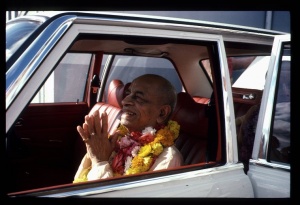CC Adi 7.140 (1975)

A.C. Bhaktivedanta Swami Prabhupada
TEXT 140
- tāṅre 'nirviśeṣa' kahi, cic-chakti nā māni
- ardha-svarūpa nā mānile pūrṇatā haya hāni
SYNONYMS
tāṅre—unto Him; nirviśeṣa—impersonal; kahi—we say; cit-śakti—spiritual energy; nā—do not; māni—accept; ardha—half; svarūpa—form; nā—not; mānile—accepting; pūrṇatā—fullness; haya—becomes; hāni—defective.
TRANSLATION
"When we speak of the Supreme as impersonal, we deny His spiritual potencies. Logically, if you accept half of the truth, you cannot understand the whole.
PURPORT
In the Upaniṣads it is said:
- oṁ pūrṇam adaḥ pūrṇam idaṁ
- pūrṇāt pūrṇam udacyate
- pūrṇasya pūrṇam ādāya
- pūrṇam evāvaśiṣyate
This verse, which is mentioned in the Īśopaniṣad, Bṛhad-āraṇyaka Upaniṣad and many other Upaniṣads, indicates that the Supreme Personality of Godhead is full in six opulences. His position is unique, for He possesses all riches, strength, influence, beauty, knowledge and renunciation. Brahman means the greatest, but the Supreme Personality of Godhead is greater than the greatest, just as the sun globe is greater than the sunshine, which is all-pervading in the universe. Although the sunshine that spreads all over the universes appears very great to the less knowledgeable, greater than the sunshine is the sun itself, and greater than the sun is the sun-god. Similarly, impersonal Brahman is not the greatest, although it appears to be so. Impersonal Brahman is only the bodily effulgence of the Supreme Personality of Godhead, but the transcendental form of the Lord is greater than both the impersonal Brahman and localized Paramātmā. Therefore whenever the word Brahman is used in the Vedic literature, it is understood to refer to the Supreme Personality of Godhead.
In the Bhagavad-gītā the Lord is also addressed as Parabrahman. Māyāvādīs and others sometimes misunderstand Brahman because every living entity is also Brahman. Therefore Kṛṣṇa is referred to as Parabrahman (the Supreme Brahman). In the Vedic literature, whenever the words Brahman or Parabrahman are used, they are to be understood to refer to the Supreme Personality of Godhead, Kṛṣṇa. This is their real meaning. Since the entire Vedic literature deals with the subject of Brahman, Kṛṣṇa is therefore the ultimate goal of Vedic understanding. The impersonal brahmajyoti rests on the personal form of the Lord. Therefore although the impersonal effulgence, the brahmajyoti, is the first realization, one must enter into it, as mentioned in the Īśopaniṣad, to find the Supreme Person, and then one's knowledge is perfect. The Bhagavad-gītā (BG 7.19) also confirms this: bahūnāṁ janmanām ante jñānavān māṁ prapadyate. One's search for the Absolute Truth by dint of speculative knowledge is complete when one comes to the point of understanding Kṛṣṇa and surrenders unto Him. That is the real point of perfectional knowledge.
Partial realization of the Absolute Truth as impersonal Brahman denies the complete opulences of the Lord. This is a hazardous understanding of the Absolute Truth. Unless one accepts all the features of the Absolute Truth-namely, impersonal Brahman, localized Paramātmā and ultimately the Supreme Personality of Godhead-his knowledge is imperfect. Śrīpāda Rāmānujācārya, in his Vedārtha-saṅgraha, says: jñānena dharmeṇa svarūpam api nirūpitam, na tu jñāna-mātraṁ brahmeti katham idam avagamyate. He thus indicates that the real absolute identity must be understood in terms of both His knowledge and His characteristics. Simply to understand the Absolute Truth to be full of knowledge is not sufficient. In the Vedic literature (Muṇḍaka Upaniṣad 1.1.9) we find the statement yaḥ sarva-jñaḥ sarva-vit, which means that the Absolute Truth knows everything perfectly, but we also learn from the Vedic description parāsya śaktir vividhaiva śrūyate that not only does He know everything, but He also acts accordingly by utilizing His different energies. Thus to understand that Brahman, the Supreme, is conscious is not sufficient. One must know how He consciously acts through His different energies. Māyāvāda philosophy simply informs us of the consciousness of the Absolute Truth but does not give us information of how He acts with His consciousness. That is the defect of that philosophy.